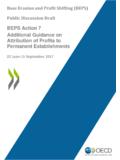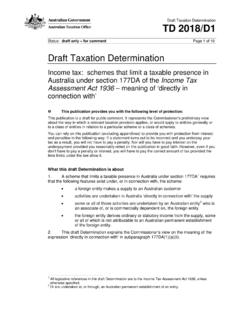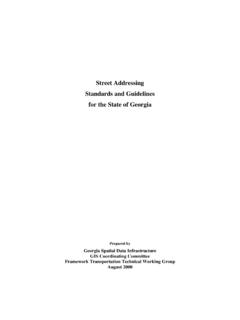Transcription of LB&I International Practice Service Transaction Unit
1 LB&I International Practice Service Transaction unit Shelf Cross-Over Volume 16 Treaties UIL Code 9450 Part Determination of Permanent establishment Status Level 2 UIL Chapter Fixed Place of business Level 3 UIL N/A Sub-Chapter N/A Seconded Employees unit Name Creation of a Permanent establishment (PE) through the Activities of Seconded Employees in the United States Document Control Number (DCN) (2014) Date of Last Update 09/03/14 Note: This document is not an official pronouncement of law, and cannot be used, cited or relied upon as such.
2 Further, this document may not contain a comprehensive discussion of all pertinent issues or law or the IRS's interpretation of current law. 2 draft Volume Part Chapter Sub-Chapter Treaties Determination of Permanent establishment Status Fixed Place of business Seconded Employees - Volume Part Chapter Sub-Chapter Treaties Determination of Permanent establishment Status Fixed Place of business Seconded Employees Table of Contents (View this PowerPoint in Presentation View to click on the links below) General Overview 2 Issue and Transaction Overview Transaction and Fact PatternSummary of Potential Issues Audit Steps Training and Additional Resources Glossary of Terms and Acronyms Index of Related Issues 3 draft Volume Part Chapter Sub-Chapter Treaties Determination of Permanent establishment Status Fixed Place of business Seconded Employees.
3 Volume Part Chapter Sub-Chapter Treaties Determination of Permanent establishment Status Fixed Place of business Seconded Employees Issue and Transaction Overview Creation of a PE through the Activities of Seconded Employees in the United States Background: Under the Internal Revenue Code, a foreign company that carries on a trade or business in the United States is subject to tax at the same progressive rates as corporations, but only with respect to income effectively connected with its trade or business .
4 However, if the foreign company elects to be taxed under the provisions of an applicable income tax treaty, it will generally only be subject to tax on its profits attributable to a permanent establishment . In general, the nature and amount of activities that would lead to a foreign company being engaged in a trade or business are broader than those that would create a permanent establishment . Permanent establishment Concept in Income Tax Treaties: In general, income tax treaties define a permanent establishment to include a fixed place of business in the United States through which the foreign enterprise carries on its business .
5 However, a foreign enterprise will not be deemed to have a permanent establishment if its activities in the United States are limited to certain activities -- generally those of a preparatory or auxiliary nature. A separate IPS unit covers this exception. A foreign enterprise will also be considered to have a permanent establishment in respect of activities undertaken on its behalf by a dependent agent who has and habitually exercises in the United States an authority to conclude contracts that are binding on the foreign enterprise. A foreign enterprise will not be deemed to have a permanent establishment in the United States merely because it carries on business in the United States through a broker, general commission agent, or any other agent of an independent status, provided that such person is acting in the ordinary course of his business as an independent agent.
6 A separate unit covers how to determine whether a permanent establishment is created through the activities of a dependent agent. Permanent establishment Concept in Income Tax Treaty: This IPS unit examines whether a company has a permanent establishment as a result of the secondment of its employees to its affiliate. Article 5(1) of the Income Tax Treaty provides: The term permanent establishment means a fixed place of business through which the business of an enterprise is wholly or partly carried on. Therefore, under paragraph 1 of Article 5 (Permanent establishment ) of the Income Tax Treaty, a company has a permanent establishment if it carries on business through a fixed place of business in the United States.
7 As noted above, there is an exception when the activities of the company are limited to specified activities listed in the treaty. 3 Back to Table Of Contents 4 draft Volume Part Chapter Sub-Chapter Treaties Determination of Permanent establishment Status Fixed Place of business Seconded Employees - Issue and Transaction Overview (cont'd) Creation of a PE through the Activities of Seconded Employees in the United States Volume Part Chapter Sub-Chapter Treaties Determination of Permanent establishment Status Fixed Place of business Seconded Employees If the company has a permanent establishment .
8 The next step is to determine the profits attributable to such permanent establishment under Article 7 ( business Profits) of the Income Tax Treaty. A separate IPS unit covers the attribution of profits to a permanent establishment . Caveats and Explanations: Eligibility for Treaty Benefits: This IPS unit assumes that the company qualifies for the benefits of the Income Tax Treaty. The residence article and the limitation on benefits article of income tax treaties are covered in other IPS units. Appropriate Treaty: Remember that every income tax treaty is different. Although this IPS unit addresses the meaning of permanent establishment found in the Income Tax Treaty, the test in the treaty you are applying might differ.
9 Therefore, in every case involving a tax treaty, you should carefully review the permanent establishment article and any other applicable articles in the treaty, and any contemporaneous or subsequent protocol(s), memoranda of understanding, or exchange(s) of notes between the treaty countries, to determine if treaty benefits should be granted. In addition, more interpretive guidance may be found in the Treasury Department s Technical Explanation of the treaty/protocol, as well as the Joint Committee on Taxation Report, the Senate Foreign Relations Committee Report, authoritative case law, and guidance issued by the IRS.
10 Technical Explanation and OECD Model: This IPS unit refers to the Technical Explanation to the Income Tax Treaty and the Commentaries on the Organization for Economic Cooperation and Development (OECD) Model Tax Convention on Income and on Capital (OECD Model). A separate IPS unit on treaty interpretation explains the importance of Technical Explanations and the Commentaries on the OECD Model in developing cases. Issue Ordering: The ordering of the issues in this unit may not be appropriate for every fact pattern. A foreign corporation must satisfy all aspects of Article 5(1) for there to be a permanent establishment .

















